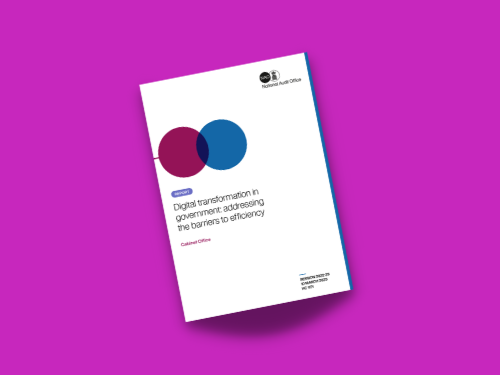Delivering citizen services fit for the future
In June 2022, we published the government’s digital strategy: Transforming for a Digital Future.
The strategy outlines our ambition for a transformed, more efficient digital government that will provide better outcomes for everyone. It lays out our transformation priorities and what we must do to achieve them:
- transforming government’s most important services
- developing a data marketplace to better enable data sharing
- adopting a ‘buy once, use many’ approach to technology
- building digital skills at scale; and
- embedding product-centric ways of working across government
We have an opportunity to continue to capture the imagination of colleagues, government leaders, ministers and the public by demonstrating what’s possible with digital ways of working. This means standing up services quickly and more efficiently, when we use rich insights to inform and evaluate policy, and deploy emerging technology to make experiences more effective.
There is momentum and appetite for transformation, and this presents an opportunity for us to continue on the trajectory that the pandemic helped accelerate - and to strive to meet rising citizen expectations.
Transforming through tough times
The current economic environment is challenging for us. But it also presents the chance to prove that digital transformation is a key lever for more cost-effective service delivery. To achieve those efficiencies a number of foundational elements must first be in place:
- the right business sponsorship
- the right capability
- the right agile ways of working; and
- the right underpinning technology to enable Management Information and data sharing
- Against this backdrop, the single greatest challenge we face is attracting and retaining top-drawer digital and technology talent in a fiercely competitive market. We are tackling this head-on, delivering brilliant talent programmes, and reskilling and strengthening digital competencies across the profession and beyond.
But this is a huge and increasing issue. It will take concerted cross-government effort and focus to make progress we can be proud of.
Transformation’s nothing without talent
In a recent blog for CDDO, I shared my thoughts on our vision that by 2025, we will have a transformed, more efficient digital government that provides better outcomes for everyone.
A central tenet for success is equipping all our people with the capability and tools for a digital future. That is why we’re focused on upskilling not just digital, data and technology (DDaT) professionals in government, but all civil servants.
I don’t underestimate the challenges we face when it comes to attracting and retaining top of the market digital talent in a fiercely competitive environment, or the benefits that could be reaped for the public if we are to succeed in building digital skills at scale.
In a recent survey that more than 75% of civil servants would like to receive more digital skills training. Government is already rising to meet this demand through the plans set out in our strategy. By 2025, we’ve committed to:
- Upskill at least 90% of senior civil servants (SCS) on digital and data essentials, with learning embedded into performance and development standards - supported with Digital Data and Technology Essentials launched as a required standard for all SCS to meet
- Deepen the skills of our DDaT professionals, 90% of whom will undertake DDaT-related training at least once a year, recording their skills to support the prioritisation of learning interventions and associated investment
- Strengthen the departmental offer to existing and prospective talent by aligning role definitions to the DDaT Capability Framework, embedding a government-wide recruitment standard, which reduces average time to hire to 30 days
Teams across government are demonstrating what’s possible when we use digital ways of working. The momentum for transformation presents an opportunity for us to satisfy citizens’ expectations, and the civil service’s appetite for change.






